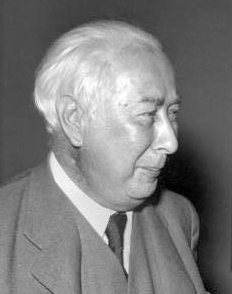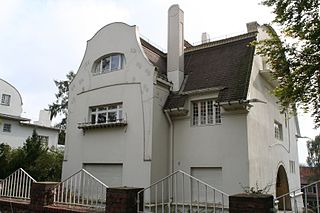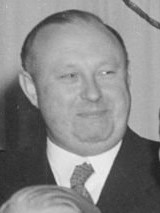
Theodor Heuss was a German liberal politician who served as the first president of West Germany from 1949 to 1959. His cordial nature – something of a contrast to the stern character of chancellor Konrad Adenauer – largely contributed to the stabilization of democracy in West Germany during the Wirtschaftswunder years. Before beginning his career as a politician, Heuss had been a political journalist.

The Deutsche Oper Berlin is a German opera company located in the Charlottenburg district of Berlin. The resident building is the country's second largest opera house and also home to the Berlin State Ballet.

The War Order of the German Cross, normally abbreviated to the German Cross or Deutsches Kreuz, was instituted by Adolf Hitler on 28 September 1941. It was awarded in two divisions: in gold for repeated acts of bravery or military leadership; and in silver for distinguished non-combat war service. The German Cross in Gold ranked higher than the Iron Cross First Class but below the Knight's Cross of the Iron Cross, while the German Cross in Silver ranked higher than the War Merit Cross First Class with Swords but below the Knight's Cross of the War Merit Cross with Swords.

The Georg Büchner Prize is the most important literary prize for German language literature. The award is named after dramatist and writer Georg Büchner, author of Woyzeck and Leonce and Lena. The Georg Büchner Prize is awarded annually for authors "writing in the German language who have notably emerged through their oeuvre as essential contributors to the shaping of contemporary German cultural life".
German submarine U-269 was a Type VIIC U-boat of Nazi Germany's Kriegsmarine during World War II. The U-boat was laid down on 18 September 1941 by Bremer Vulkan at Bremen-Vegesack, launched on 24 June 1942 and commissioned on 19 August under the command of Oberleutnant zur See Karl-Heinrich Harlfinger.

Ernst Pepping was a German composer of classical music and academic teacher. He is regarded as an important composer of Protestant sacred music in the 20th century.

The National Committee for a Free Germany was a German anti-Nazi organisation that operated in the Soviet Union during World War II.

Max Herbert Eulenberg (1876–1949), was a German poet and author born in Cologne-Mülheim, Germany. He was married from 1904 to Hedda Eulenberg.

The Deutsche Akademie für Sprache und Dichtung was founded on 28 August 1949, on the 200th birthday of Johann Wolfgang von Goethe, in the Paulskirche in Frankfurt. It is seated in Darmstadt, since 1971 in the Glückert House at the Darmstadt Artists' Colony. It is a society of writers and scholars on matters pertaining to German language and literature in the Deutsche sprachraum, or Germanosphere.

Heinrich Peter Hellwege was a German politician. Hellwege was Federal Minister for Affairs of the Federal Council (1949–1955) and Minister President of Lower Saxony (1955–1959).

The Gottbegnadeten-Liste was a 36-page list of artists considered crucial to National Socialist culture. The list was assembled in September 1944 by Joseph Goebbels, the head of the Ministry of Public Enlightenment and Propaganda, and Germany's supreme leader Adolf Hitler.

Erich Gustav Otto Engel was a German film and theatre director.

Heinrich Joseph Maximilian Johann Maria von Brentano di Tremezzo, known professionally as Heinrich von Brentano, was a German politician of the Christian Democratic Union (CDU). He served as Federal Minister for Foreign Affairs from 1955 to 1961.
Army Group C was an army group of the German Wehrmacht during World War II. In its first deployment between 1939 and 1941, its main assignment was the defense of the Franco-German border during the Phony War and the Western Campaign, after which it was moved to East Prussia to become Army Group North. When Army Group C was deployed a second time from 1943 to 1945, it was used to coordinate German forces on the Italian front.
The Gelöbnis treuester Gefolgschaft was a declaration by 88 German writers and poets of their loyalty to Adolf Hitler. It was printed in the Vossische Zeitung on 26 October 1933 and publicised by the Prussian Academy of Arts in Berlin. It was also published in other newspapers, such as the Frankfurter Zeitung, to widen public awareness of the confidence of the signed poets and writers in Hitler as the Chancellor of Germany.

The German Party was a national-conservative political party in West Germany active during the post-war years. The party's ideology appealed to sentiments of German nationalism and nostalgia for the German Empire.
German submarine U-364 was a Type VIIC U-boat of Nazi Germany's Kriegsmarine during World War II.
German submarine U-667 was a Type VIIC U-boat built for Nazi Germany's Kriegsmarine for service during World War II. She was laid down on 16 August 1941 by Deutsche Werft, Hamburg as yard number 816, launched on 29 August 1942 and commissioned on 21 October 1942 under Oberleutnant zur See Heinrich Schroeteler.

German submarine U-1171 was a Type VIIC/41 U-boat of Nazi Germany's Kriegsmarine during World War II.

German submarine U-1204 was a Type VIIC U-boat of Nazi Germany's Kriegsmarine during World War II.















